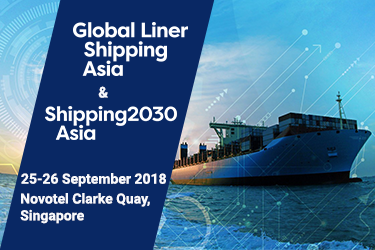#GLSEurope: An Open Discussion About The Real Issues in Liner Shipping

First of all, we must thank all attendees, speakers, and sponsors for coming to Hamburg and making Global Liner Shipping (GLS) the success that it was.
In only two days, GLS managed to bring together 170+ industry stakeholders to debate game-changing hot topics like consolidation, digital technologies, sustainability, and so much more!
Read Lloyd’s List’s detailed reports on the event here.
The Future of Consolidations in Shipping
Rolf Habben Jansen, Chief Executive of Hapag-Lloyd, expects consolidation in shipping to continue into 2019, however, mergers and acquisitions are not the way to go forward. According to Lars Jensen, CEO and Partner at SeaIntelligence Consulting, with only a few smaller, regional players left to be absorbed by large carriers, M&As are a thing of the past.
Rising Business and Operational Challenges
The integration of three carriers – NYK, MOL, and K Line – into Ocean Network Express has experienced some challenges recently with booking systems to their customers’ displeasure. Although ONE had a year to prepare for the integrations, Jeremy Nixon, Chief Executive of Ocean Network Express, admitted at GLS that the process met unexpected challenges, such as ineffective staff training, but solutions are coming.
“We have added 20% more staff in service centres to speed up the documentation process and are speeding up bring over staff from MOL, L Line and NYK”, Nixon said. “We have been working long hours to completely catch up on the booking and documentation backlog. We’re not completely there yet, but we have almost finished tidying up.”
Shipping has also met external challenges to its efforts to consolidate. Jochen Gutschmidt, Head of Global Logistics Procurement at Nestle, mentioned inconsistent lead times as one of the issues that keeps carrier reliability in the mid-70%s.
“We work in a business that has a heavy administrative load and there is a tough regulatory environment,” Mr Gutschmidt said. “There are processes for approvals and stock flows and it is a challenge to keep up with the lead times we have.”
The Ability to Meet Customer Expectations
Consolidation that resulted in unreliable services can create more problems than customer dissatisfaction. Paulo Montrone, Head of Global Trade at Kuehne + Nagel, warned that e-commerce giants like Amazon may become liner shippers’ new competitors, if the industry doesn’t fix its current inefficiencies.
“Amazon is looking for extreme quality in service delivery”, Montrone said at GLS. “If the industry cannot offer a ‘best-in-class’ solution then they will be obliged to step in if they cannot manage the service customers want.”
Currently, the answer to improving efficiencies is innovation and technology. However, buying solutions off the shelf is not necessarily the best way to go about it.
Technology: The Need for One Industry-Wide Blockchain Solution
As we have reported before, the race to bring blockchain into the maritime industry is happening already, but according to Rolf Habben Jansen, the attempts to develop this technology have been narrow-minded.
“Everyone is setting their own standards and agenda,” Habben Jansen explained as he calls for more governance and collaboration.
Blockchain researcher and developer BLOC, now in partnership with Lloyd’s Register Foundation, took this as an opportunity to raise awareness of this issue and invite the industry to collaborate.
We'd like to invite Rolf Habben Jansen and @cmacgm to BLOC to see the works of a bottom up driven blockchain solutions that is not only developed for, but WITH the industry #collaboration #maritime #blockchain https://t.co/2cyYhw6NOL
— BLOC (@un_BLOC) May 16, 2018
Predicting the Cost of the 2020 Sulphur Cap
Shipping investor and advisor Franck Kayser, who has been involved in several projects to ready containerships for the 2020 sulphur cap, joined a panel at GLS to discuss the viability of an LNG fuelled shipping industry. There are high costs involved, of course, but that is the price for a cleaner environment. Although many theories exist on what the fuel prices would look like in the future, LNG seems like the safest bet, even though installations would cost much more than scrubbers, for example.
